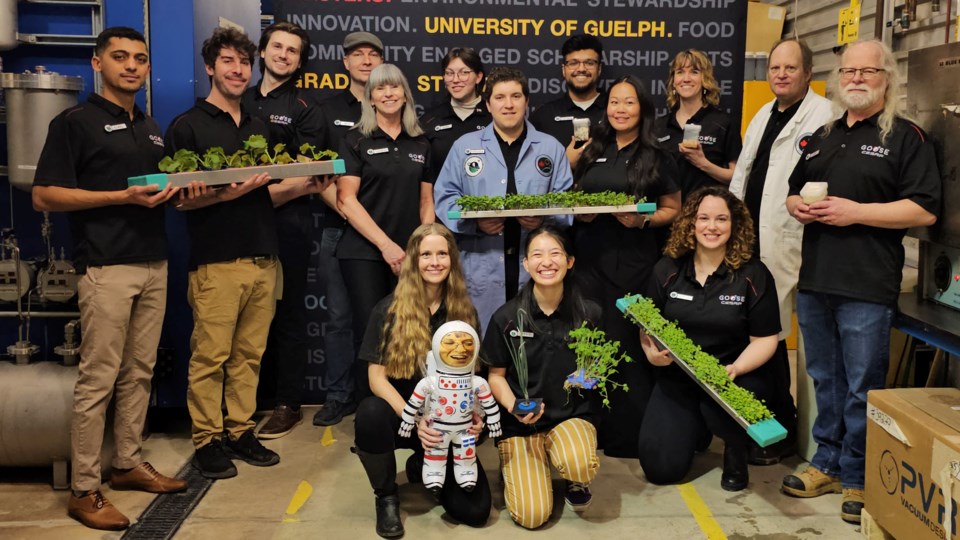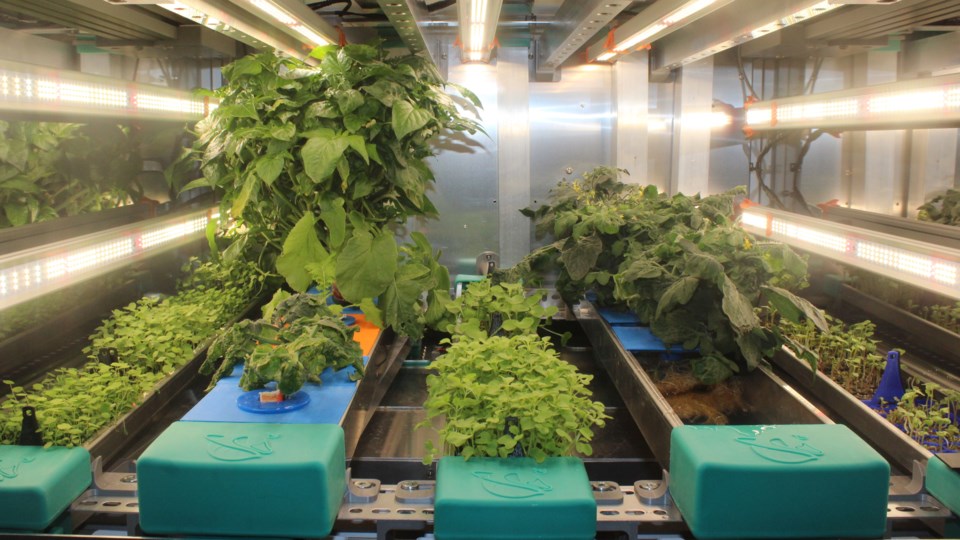It’s smaller and more compact than the prototype.
But students at the University of Guelph are hoping the Canada GOOSE self-contained plant growth chamber can sprout not only a big cash prize, as well as lessons on how to grow food in outer space.
Judges from the Canadian Space Agency were back at the University of Guelph Wednesday to view the final Canada GOOSE, one of the final four entries into the Deep Space Food Challenge.
Last year, the CSA judges were in town to view a prototype and take notes ahead of selecting finalists.
The U of G entry made the cut among 12 entries at that stage, earning a $100,000 grant and a 12-month window to build a newer version.
The new Canada GOOSE is a bit smaller than the prototype, which was about 10 feet tall.
The final entry, for comparison, is less than two metres in length, and the total volume is less than two cubic metres.
“In space, volume in space is extremely scarce. If you have a base, you don’t have the luxury of wide open space,” said Ajwal Dsouza, a PhD student and member of the Canada GOOSE team. “Your system has to be as compact as it can be.”
Dsouza said getting the materials to build it from scratch was the biggest challenge.
“But we’re glad we have the system up and running now,” he said.
The look of it resembles something out of a science fiction movie. Mirrors encasing the outside, all the technology running it on the back of this cube-shaped chamber on wheels.
Lights illuminate the three levels of trays inside. Unlike the prototype, the trays pull out, and the compartments can be removed for easier access to the various foods being grown.
What food exactly? Well, there are micro-greens and macro greens, fruits and vegetables such as lettuce, tomatoes and peppers. Mustard seeds are in there, radishes and more.
“Throughout our testing, we’ve had a chance to taste our produce,” Dsouza said.
“The things we grew in this we had to send for sampling, so we couldn’t, but I will assure you, they tasted delicious.”
The goal of the competition is to build something that could be used by astronauts and future inhabitants of the Moon, Mars, and beyond.
“Carrying food to these locations for long-term missions is not feasible because of the mass,” Dsouza said. “And if astronauts are going there on missions, they’ll be there for six months, and this doesn’t even count the time that’s required to reach there.”
Plus, while astronauts can get away with eating pre-packaged processed food during missions at the International Space Station, “it’s not the same as having fresh lettuce, fresh vegetables that’s grown, that you could harvest.”
The whole competition started in 2021, so many students have come and gone since then.

Nykole Crevits, co-owner of Noki Farms in the Quebec Street Shoppes, came on board after graduating. Noki Farms grows mushrooms and micro-greens.
She’s not only contributed as an industry partner, but is also taking this as a great learning experience.
“It’s been fantastic,” Crevits said. “We’re growing mushroom varieties that we don’t grow in the business, so it’s been nice to learn a lot more about different varieties.
“Also really completely flipping the whole system of production on its head, going from our recent challenges with the business has been scaling up, and then coming here, actually scaling down to fit within constraints for the project.”
The winner of the challenge will be announced sometime this spring, with the winner receiving a $380,000 prize.
The money could be used for other projects or ways to update the facility, among other things.
But win or lose, commercialization and education are two big things the team is looking forward to, beyond the competition.
“We believe that this could be commercialized and placed in Canada’s north, downtown in some city centre or up in space,” said Mathew Wake, a second-year masters candidate.
“It’s very versatile, and can be used in any one of those facets.”



